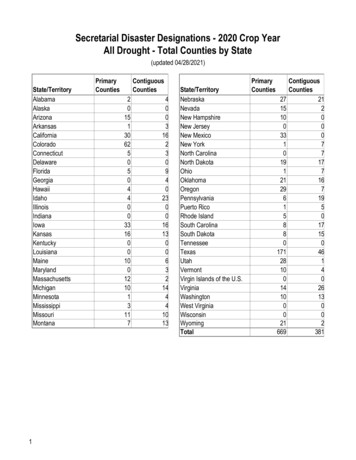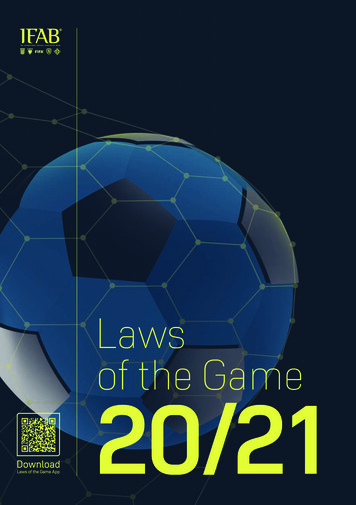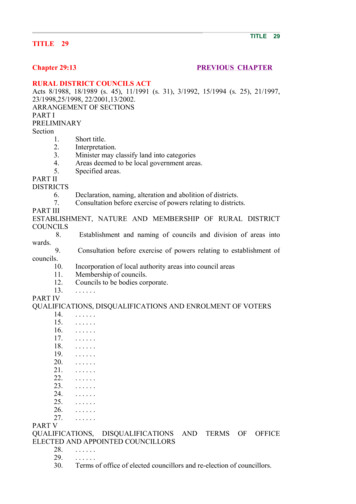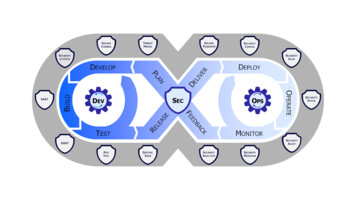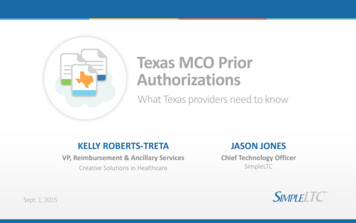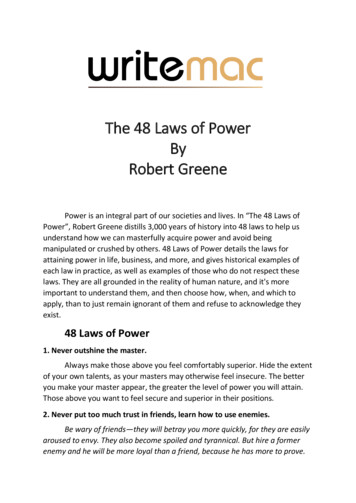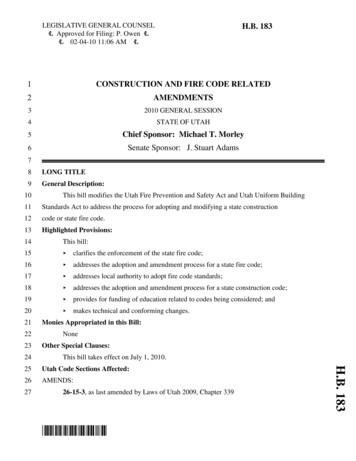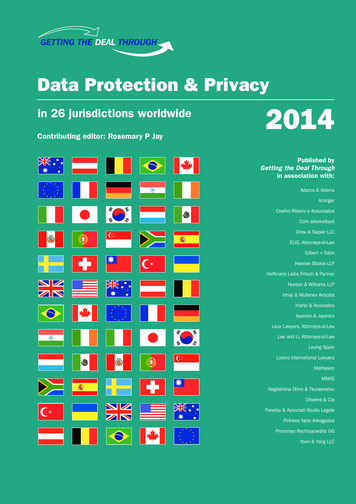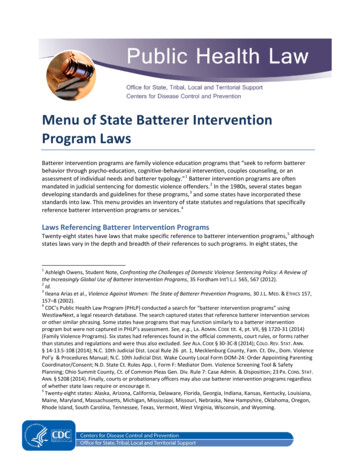
Transcription
TEXASTEXAS — State Laws by Topic AGE Employers are prohibited from discriminating against an individual on the basis of age. However, employers are permitted to apply different standards of compensation, or different terms,conditions, or privileges of employment, under a bona fide seniority system, merit system, anemployee benefit plan, or a system that measures quantity or quality of production, as long as thesystem or plan is not a result of an intent to discriminate.For purposes of state law, age means 40 years of age and older, and an employer is defined asan individual who is engaged in an industry affecting commerce and who has 15 or more employees for each working day in each of 20 or more calendar weeks in the current or precedingcalendar year. AIDS Discrimination: According to the Texas attorney general, under the Texas Commission of Human Rights, AIDS is a protected disability.Testing: Under the Texas Communicable Disease Prevention and Control Act, forced testingfor AIDS by employers is prohibited, unless a bona fide occupational qualification exists and lessdiscriminatory means of satisfying the occupational qualification does not exist. ARRESTS/CONVICTIONS No general provision prohibiting an employer’s collection and use of arrest or conviction records.No lawsuit may be brought against employers based solely on evidence that an employee hasbeen convicted of an offense. BREAKS No provision. BREAST-FEEDING An employer may use the designation “mother-friendly” in its promotional materials if it develops a policy supporting the practice of worksite breast-feeding that addresses all of the following.Revised Winter 2015 - 2016
TEXAS Flexible work scheduling, including scheduling breaks and permitting work patterns thatprovide time for the expression of breast milk. A convenient, sanitary, safe, and private location, other than a restroom, allowing privacyfor breast-feeding or expressing breast milk. A convenient, clean, and safe water source with facilities for washing hands and rinsingbreast-pumping equipment located in a private location. Access to hygienic storage alternatives in the workplace for the mother’s breast milk.In addition, a woman is entitled to breast-feed her child in any location in which she is authorized to be present. CHILD LABOR Click on the following link http://www.twc.state.tx.us/ui/lablaw/cllsum.html for a summary ofTexas’s child labor law. CHILD SUPPORT Employers served with a child support order must begin withholding with the next scheduledpayday after the order is served. Severance pay is considered wages for purposes of child support withholding. Amounts are remitted immediately; electronic remittances must be made withintwo days of payday. Notify the custodial parent and the court or the agency within seven days ifthe employee-obligor terminates. Employers that receive withholding orders in Title IV-D casesthat require withholding for arrears must notify the Title IV-D agency prior to paying any lumpsum payment (e.g., bonuses, commissions, amounts paid in lieu of vacation or other leave time)of 500 or more. After notifying the Title IV-D agency, payments may not be made before theearlier of 10 days after the date the agency was notified or the date on which the agency authorizes payment. Payments must be made in accordance with the agency’s authorization. By thesecond business day after payday, employers with 250 or more employees must remit withheldchild support via electronic funds transfer or electronic data interchange. Employers that fail toremit amounts withheld electronically to the state disbursement unit may be subject to a 25 payment processing surcharge. Employers can’t charge employees or withhold this surcharge fromemployees’ pay. COURT ATTENDANCE Employers may not discharge or discipline employees for complying with subpoenas to appearas witnesses in any proceeding. Employees who are required to attend juvenile hearings may notbe terminated from employment for attending the hearing. Employees must notify employers, assoon as practical after the hearing, about their intention to return to employment.Revised Winter 2015 - 2016
TEXAS DISABILITIES Employers are prohibited from refusing to hire; discharging; limiting, segregating, or classifying; or otherwise discriminating against an otherwise qualified individual with respect to compensation or terms, conditions, or privileges of employment based on disability.For purposes of state law, an employer is defined as an individual who is engaged in an industry affecting commerce and who has 15 or more employees for each working day in each of 20or more calendar weeks in the current or preceding calendar year. DRUG TESTING Each employer in Texas with 15 or more employees who maintains Workers’ Compensationinsurance coverage has to adopt a drug-free workplace policy designed to eliminate drug abuseand its effects in the workplace. The policy must address:1. the purpose and scope of the policy;2. the consequences of violating the policy;3. a description of, and the requirements and availability for participating in, any treatment,rehabilitation, or employee assistance programs; and4. a description of any drug-testing program that the employer has in effect.Notification: The employer must distribute a written copy of this policy to each employee. FAMILIAL/MARITAL STATUS No provisions specified in the general employment context. FAMILY/MEDICAL LEAVE Coverage: State employers.Length of leave: Dependent on amount of accrued paid sick leave.Reasons for leave: Leave may be taken for the employee’s own illness or the illness of a family member. Use of family leave to care for relatives not residing with the employee is limited tochildren or parents with documented illnesses. GENETIC TESTING It is an unlawful employment practice for employers to discharge, fail or refuse to hire, or otherwise discriminate against an individual with respect to compensation or the terms, conditions, orRevised Winter 2015 - 2016
TEXASprivileges of employment on the basis of genetic information concerning the individual or becausethe individual refuses to submit to genetic testing. HEALTH CARE CONTINUATION COVERAGE Continuation coverage requirements generally apply to employers that provide group healthinsurance coverage to employees. Eligible employees have the right to continue coverage for upto nine months.Click on the following link IN.1251.htm#1251.251 to access the continuation coverage provisions. JURY DUTY Private employers may not discharge employees because of jury service if notice is provided assoon as practical after release from jury service about their intention to return to work. Employees are entitled to reinstatement unless employers’ changed circumstances make it impossible orunreasonable.State employees who are called to jury duty may not have any fees or compensation receivedfor jury service deducted from wages. LIFESTYLE DISCRIMINATION No provision. MASS LAYOFF NOTIFICATION No state-specific notification provision. MEDICAL DONATION LEAVE Employees of a state agency are entitled to a leave of absence without a reduction in salaryfor the time necessary to serve as a bone marrow or organ donor. The leave of absence may notexceed: 1) five working days in a fiscal year to serve as a bone marrow donor, or 2) 30 workingdays in a fiscal year to serve as an organ donor.A state agency must also allow each agency employee sufficient time off, without a deductionin salary or accrued leave, to donate blood.Revised Winter 2015 - 2016
TEXAS MILITARY LEAVE Employers may not terminate the employment of a permanent employee who is a member ofthe state military forces because the employee is ordered to active duty or authorized training.Reinstatement: An employee who takes military leave is entitled to return to the same employment held when ordered to duty or training, and may not be subjected to loss of time, efficiency rating, vacation time, or any benefit because of the absences. The employee must givewritten or actual notice of the intent to return to work as soon as practicable after release fromduty. Restoration is not required if the employer’s circumstances have so changed as to make itimpossible or unreasonable to do so. MINIMUM WAGE Minimum hourly wage/overtime rate: 7.25/ 10.88.Basis for overtime: Over 40 hours/week.Opportunity wage for under 20-year-olds: None. NATIONAL ORIGIN Employers are prohibited from refusing to hire; discharging; limiting, segregating, or classifying; or otherwise discriminating against an individual with respect to compensation or terms, conditions, or privileges of employment based on national origin, which includes the national origin ofan ancestor.For purposes of state law, an employer is defined as an individual who is engaged in an industry affecting commerce and who has 15 or more employees for each working day in each of 20or more calendar weeks in the current or preceding calendar year. NEW-HIRE REPORTING Data to be reported: Employee’s name, address, SSN, dates of birth and hire, salary information; employer’s name, address, federal EIN.Employers must report as new hires employees who have been off the payroll for at least 60consecutive days.Reporting deadline/form: Within 10 days of hire or rehire; on W-4s. OVERTIME Basis for overtime: Over 40 hours in a workweek.Revised Winter 2015 - 2016
TEXASHospital employers are prohibited from requiring that registered and vocational nurses workovertime; on-call time cannot be used as a substitute for mandatory overtime. Nurses may berequired to work overtime in emergencies, or when they are assisting in a procedure. Prior torequiring mandatory overtime, hospitals must make a good-faith effort to staff accordingly throughvoluntary overtime. PAY STATEMENTS Information required: Written/signed statement of employee’s name; pay period; hoursworked, pay rate; gross/net pay; purpose of deductions. PERSONNEL FILES Public employers only. Personnel records of government employees are public records understatutory law. Employers may not disclose information in personnel files to the public if the disclosure would constitute a clearly unwarranted invasion of the employee’s personal privacy. POLYGRAPH TESTING No provisions specified in the general employment context. POSTING REQUIREMENTS Workers’ Compensation (English & Spanish) — All employers with Workers’ CompensationinsuranceNotice of No Workers’ Compensation (English & Spanish) — All employers who do not haveWorkers’ Compensation insuranceChild Labor Law (English & Spanish) — Recommended for all employers who employ minorsunder 18Payday Law (English & Spanish) — All employersUnemployment Insurance — All businesses with employees entitled to unemployment benefitsand covered by Payday LawsEqual Employment Opportunity — Recommended for all employersNote to Employees (Texas Hazard Communication Act) (English & Spanish) — All public employersEmployers’ Notification of the Ombudsman Program to Employees (English & Spanish) —Required for all employers that elect to obtain Workers’ Compensation coverageChoking Poster — Required for all employers in the food service industryRevised Winter 2015 - 2016
TEXAS PREGNANCY Coverage: Employers with 15 or more employees in each of 20 or more calendar weeks inthe current or prior year.General rule: Women affected by pregnancy, childbirth, or related medical conditions mustbe treated for all employment-related purposes, including receipt of benefits under fringe benefitplans, in the same manner as another employee not affected by pregnancy, childbirth, or a relatedmedical condition, but similar in the ability or inability to work, who is also affected by a temporarydisability. RACE Employers are prohibited from refusing to hire; discharging; limiting, segregating, or classifying; or otherwise discriminating against an individual with respect to compensation or terms,conditions, or privileges of employment based on race or color.For purposes of state law, an employer is defined as an individual who is engaged in an industry affecting commerce and who has 15 or more employees for each working day in each of 20or more calendar weeks in the current or preceding calendar year. REFERENCES Blacklisting: Employers cannot attempt to prevent any voluntarily or involuntarily terminatedemployee from obtaining other employment. However, upon request by either the former employee or a prospective employer, a former employer can supply a truthful written statement ofthe reason for separation. The ex-employee is entitled to a complete copy or true statement ofany communication made by the former employer to any prospective employer. If within 10 daysof receiving a request from the discharged employee, the former employer fails to give the exemployee a true, written statement of reasons for discharge, then the former employer may notfurnish statements regarding the discharge to any other person, except upon the request of thedischarged employee.References: Employers are immune from civil liability for disclosing information about a current/former employee’s job performance to a prospective employer.Service letters: A corporation, company, or individual may give, on application from a discharged employee or a person desiring to employ the employee, a written truthful statement ofthe reason for the discharge. The statement may not be used as the cause for a civil or criminalaction for libel against the person who furnishes the statement. RELIGION Employers are prohibited from discriminating against an individual based on religion, includingany aspect of religious observance, practice, or belief, unless an employer demonstrates that it isRevised Winter 2015 - 2016
TEXASunable to reasonably accommodate the religious observance or practice of an employee or applicant without undue hardship to the conduct of its business.For purposes of state law, an employer is defined as an individual who is engaged in an industry affecting commerce and who has 15 or more employees for each working day in each of 20or more calendar weeks in the current or preceding calendar year. REPORTING PAY No provision. SAFETY No OSHA-monitored state plan. For general information, click on http://www.osha.gov/. SCHOOL VISITATION LEAVE For state employers only. Parents, or those standing in a parental relation to a child, are entitled to up to eight hours of sick leave each calendar year to attend parent-teacher conferences fortheir children in pre-kindergarten through 12th grade. Employees must give reasonable advancenotice of the intention to use sick leave to attend parent-teacher conferences. SEX DISCRIMINATION Employers are prohibited from refusing to hire; discharging; limiting, segregating, or classifying; or otherwise discriminating against an individual with respect to compensation or terms,conditions, or privileges of employment based on sex.For purposes of state law, an employer is defined as an individual who is engaged in an industry affecting commerce and who has 15 or more employees for each working day in each of 20or more calendar weeks in the current or preceding calendar year. SEXUAL HARASSMENT A public servant acting within his/her employment authority commits an offense if he/sheintentionally subjects another to sexual harassment, which is defined as unwelcome sexual advances, requests for sexual favors, or other verbal or physical conduct of a sexual nature, submissionto which is made a term or condition of a person’s exercise or enjoyment of any right, privilege,power, or immunity, either explicitly or implicitly.State agencies must provide employees with employment discrimination training, which shouldinclude, in part, sexual harassment training, within 30 days after being hired and then on a supplemental basis every two years.Revised Winter 2015 - 2016
TEXAS SEXUAL ORIENTATION DISCRIMINATION No provision. SMOKING Smoking and possession of a burning tobacco product are banned, except in designated areas,in the following locations: public schools; elevators; enclosed theaters and movie houses; libraries;museums; hospitals; and transit system buses, intrastate buses, and public airplanes and trains. SOCIAL SECURITY NUMBER PRIVACY An entity may not require an individual to disclose his/her Social Security number to obtaingoods or services from, or enter into, a business transaction with the entity, unless the entity:adopts a privacy policy; provides the privacy policy to the individual as required (see below); andmaintains the confidentiality and security of a disclosed Social Security number.The an entity shall provide its privacy policy to an individual whose Social Security numberit requires by: reciting the policy to the individual at the time the individual is required to disclosehis/her Social Security number, or mailing the policy to the individual as soon as practicable afterthe individual is required to disclose his/her Social Security number.If the entity elects to recite a privacy policy to an individual, the entity shall deliver a writtencopy of the policy to the individual within a reasonable time after the individual’s Social Securitynumber is disclosed. The written copy of the privacy policy may be delivered by mail or electronically.Entities are also required to: 1) destroy records that contain personal information and that areno longer to be retained, and 2) disclose unauthorized access to personal information to thoseindividuals whose information may have been accessed. UNEMPLOYMENT INSURANCE Click on the following link .html toaccess the Texas Workforce Commission unemployment, labor law, and appeals informationhome page for businesses and employers. VACATION PAY UPON TERMINATION Paid time off (PTO) or paid days off (PDO) are wages, unless an employer’s written policydefines PTO/PDO as something other than a combination of vacation, holiday, sick leave, parental leave, or severance pay. PTO/PDO is payable to employees upon termination only if a writtenagreement with the employer or a written policy of the employer specifically provides for payment.Revised Winter 2015 - 2016
TEXAS VIOLENCE Employees who are licensed to carry concealed or holstered weapons may store their weaponsin their locked vehicles. VOTING Employers must give employees sufficient time to vote, unless an employee already has twoconsecutive hours outside of working hours when polls are open.Wages: Leave will be paid. WAGE DEDUCTIONS Employers may not withhold or divert any part of an employee’s wages unless ordered to doso by a court; authorized to do so by state or federal law; or authorized in writing by an employee.State employees may authorize wage deductions for charitable contributions.In recouping loans made to employees, employers may credit the loan repayment toward anyminimum wages or overtime due employees. In recouping loans made to employees from theirpaychecks, including final paychecks, employers can’t withhold more than the agreed amount.The agreed amount is the amount identified in writing as the amount to be withheld from anypaycheck or otherwise authorized in writing by employees for repayment of their loans.Employers may withhold wage advances from the paychecks that directly follow the advances,if employers provide employees with notice that the amount is an advance that will be recoveredfrom the next paycheck and employees agree to the amount to be withheld. WAGE GARNISHMENT All wages are exempt from creditor garnishment. WAGE PAYMENT ON TERMINATION Employee who quits: Next payday.Employee who’s fired: Within six days. WAGE PAYMENTS Payday requirements: At least semimonthly, an equal number of days apart. Employers maypost their list of designated paydays electronically.Revised Winter 2015 - 2016
TEXASDirect deposit: Employers may require employees to be paid electronically if employer gives60 days’ notice and employee provides bank account information. WHISTLEBLOWING It is an unlawful employment practice for an employer to retaliate or discriminate against aperson who opposes a discriminatory practice, makes or files a discrimination charge, files a discrimination complaint, or participates in any manner in a discrimination investigation, proceeding,or hearing.For purposes of state law, an employer is defined as any person engaged in an industry affecting commerce and employing 15 or more employees. WORK AUTHORIZATION No general provision. WORKERS’ COMPENSATION Click on the following link http://www.tdi.state.tx.us/wc/indexwc.html to access the TexasDepartment of Insurance, Division of Workers’ Compensation home page. For Workers’ Compensation resources for employers, click on Revised Winter 2015 - 2016
Note to Employees (Texas Hazard Communication Act) (English & Spanish) — All public em-ployers Employers' Notification of the Ombudsman Program to Employees (English & Spanish) — Required for all employers that elect to obtain Workers' Compensation coverage Choking Poster — Required for all employers in the food service industry.
